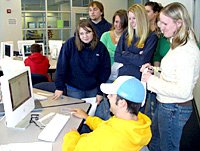Preservice Technology Field Experience: A Call for Suggestions
Your content has been saved!
Go to My Saved Content.Many people believe that a high-quality teacher-education program must include field experience for teacher candidates in all education courses. Organizations such as the National Network for Educational Renewal and the Association of Teacher Educators strongly support this concept.
I teach a required technology course designed for extending teacher candidates' technology skills, modeling classroom technology use, and providing a sense of how technology can be utilized to support effective student learning. The course is paperless, requiring students to employ the computer for all course activities. All assignments are submitted electronically, then scored using online rubrics and an online feedback system.

The field experience for this class has been problematic. Originally, we just took students to our partner schools and asked the principals to put them in a classroom for a couple hours to observe good teaching. The difficulty was that it was rare for a student to actually observe a teacher using technology. When you pick a day and everyone goes to the school at once, you have no control over what the students will see. A few might happen to be in a classroom where technology is being used, but most of the time, they don't see it.
It is hard for us to convince students that they need to have technology skills when they don't experience much of it in their education and they don't see it being modeled during their field experience. The result is teacher candidates who do not have a good concept of what it is to be an effective technology-using teacher.
The next thing we tried was to find teachers who we knew were using technology or who were interested in using technology and to have students develop materials for teachers to use in their classrooms, including a PowerPoint presentation and a Web-based lesson plan on teacher-requested topics. The most difficult part of this system, however, is communication between teachers and students: Students are not always responsible and timely in contacting teachers, and teachers don't always regularly read and respond to students' email.
Now, we just ask teachers to tell us the topics on which our students should develop their materials. At the end of the semester, we burn all the projects on CDs and send copies out to all our consulting teachers. The big drawback here is that little interaction occurs between practicing teachers and teacher candidates.
My questions are, "What is the best way to conduct a technology field experience for preservice teachers? Does anyone have a model that works for them? Do you have an idea that might be more effective than what we have already tried?"
Our limitations are that the class meets for two seventy-five-minute periods each week. We are in a rural area, where it takes up to forty-five minutes to drive to some of our partner schools. Our experience must utilize technology to facilitate the teacher-student interaction.
Please offer your suggestions and feedback.